 Publicly condoning military action and using economic sanctions to provoke it will only exacerbate Venezuelan suffering and further damage the tattered reputation of the US on democracy and human-rights issues in the Western Hemisphere, writes Timothy M. Gill (University of North Carolina, Wilmington).
Publicly condoning military action and using economic sanctions to provoke it will only exacerbate Venezuelan suffering and further damage the tattered reputation of the US on democracy and human-rights issues in the Western Hemisphere, writes Timothy M. Gill (University of North Carolina, Wilmington).
Since the election of former Venezuelan President Hugo Chávez in 1998, the US and Venezuela have been at odds.
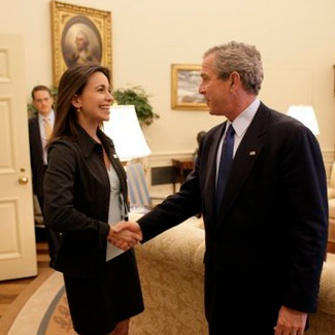
US state elites repeatedly condemned Chávez and his socialist policies, met with opposition leaders in Washington, and failed to recognise the electoral success of both Chávez and his successor the current president Nicolás Maduro.
Chávez, meanwhile, aligned himself with several US foes (such as Iran and Russia), routinely lambasted US imperialism, expelled the US ambassador, and ultimately blamed the US for the 2002 coup d’état which temporarily removed him from power.
The Trump administration’s approach on Venezuela and Latin America
Like Iran and North Korea, Venezuela has remained a top foreign-policy priority for the new Trump administration. While certain elements within it have pushed for a harsh response to President Maduro, other individuals – recently retired Under Secretary Tom Shannon, for example – have discouraged the application of more dramatic measures like a ban on oil imports from Venezuela, which the administration has been seriously considering.
While US administrations from Clinton to Trump via Bush and Obama have made no secret of their disdain for Venezuela’s socialist government, only the Trump government has publicly signalled its support for a military coup in the country.
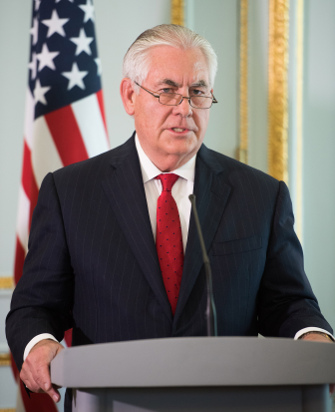
Speaking at the University of Texas before his recent tour of Latin America, Secretary of State Rex Tillerson stated plainly that he believed “there will be a change [in Venezuela],” and that the Venezuelan military would ultimately carry it out.
Tillerson also claimed that:
[in] the history of Venezuela, and, in fact, the history in other Latin American and South American countries, oftentimes it’s the military that handles that. When things are so bad that the military leadership realizes they just can’t serve the citizens anymore, they will manage a peaceful transition.
He even declared the Monroe Doctrine, which established US imperial domination over the Western Hemisphere, “a success” and asserted that it remains “as relevant today as it was the day it was written.” If anyone doubted Tillerson’s familiarity with the nature of that document, he went on to say that Latin America did “not need any new imperial powers” like China and Russia exerting their influence in the region, clearly implying that Latin America is already currently subject to the imperial power of the US.
Indeed, throughout the twentieth century, the US actively supported military coups all across Latin America, from Guatemala and Nicaragua in Central America to Argentina and Chile in the Southern Cone. But these coups led to nothing remotely approaching “peaceful transition”.
The Guatemalan military, for instance, committed what many consider genocide against local indigenous populations, whereas the Chilean regime disappeared tens of thousands of left-wing activists. These governments safeguarded US economic and security interests, but only by terrorising their own citizens.
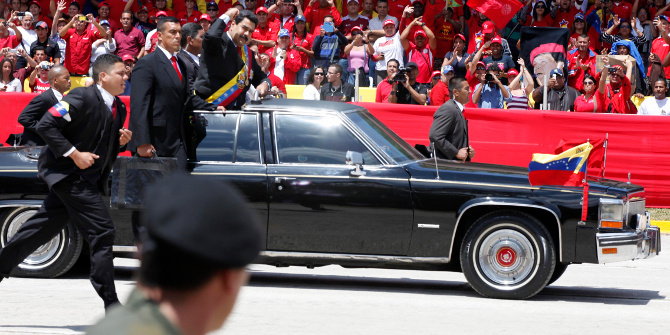
The threat of oil-related sanctions and the 2018 elections
As well as voicing support for a military coup, Tillerson also indicated that the Trump administration is weighing up the nuclear option of banning oil imports from Venezuela.
The severely debilitated Venezuelan economy relies almost exclusively on oil exports for foreign exchange, much of which continues to come from sales to refineries on the US Gulf Coast.
Despite Maduro’s claims that Venezuela would survive any embargo, in reality this would doubtless prove catastrophic for the Venezuelan economy, intensifying the already significant suffering of citizens all across the country. It is hard to envision a means of compensating for the loss of this foreign exchange, which is desperately needed to service foreign debt and cover the imports that keep a minimum of goods on Venezuelan shelves.
In response, Maduro would also amplify his anti-imperialist rhetoric and shore up nationalist sentiment. Yet, if the Trump administration wants to scare military members into moving against the government, there is no better move to make.
There is no denying that Venezuela faces a serious political-economic crisis with no end in sight:
- Oil production and prices, which together provided the government with the windfall of foreign exchange that underpinned its heavy social spending, have both plummeted;
- hyperinflation has left the local currency virtually worthless;
- homicide rates are among the highest in the hemisphere – if not the world;
- President Maduro remains deeply unpopular throughout the country.
Though Maduro did overcome former governor Henrique Capriles in a 2013 election generally considered free and fair, he has since sought to maintain his rule through a host of authoritarian manoeuvres: sidelining the opposition-controlled National Assembly, establishing a parallel legislative body, and jailing or disbarring political adversaries.
Yet, historically the opposition hasn’t played by the rules either. In 2002, some opposition members supported a military coup and a transitional government that temporarily displaced Hugo Chávez. Opposition groups then orchestrated a months-long strike that paralysed the country by shutting down the vital oil industry. And since 2014 the opposition has periodically called for the ouster of Maduro through nationwide protests that have resulted in the death of dozens of Venezuelans, amongst them security forces, opposition activists, and government supporters alike.
Elements of the opposition have recently sought to negotiate with the Venezuelan government to work out the many messy details surrounding imminent presidential elections. But several rounds of mediated negotiations in the Dominican Republic have ended in a standstill, with the two sides unable even to achieve a temporary resolution of their many differences.
Nonetheless, presidential elections are now slated for 22 April 2018, and Maduro is undoubtedly aware of his own unpopularity. Should the government tamper with election results in an attempt to prolong its rule illegitimately, the international community – and particularly Venezuela’s neighbours – would be right to condemn these acts.
But encouraging a military coup by threatening “to make the economy scream” will only exacerbate Venezuelan suffering and further damage the tattered reputation of the US when it comes to democracy and human rights in the Western Hemisphere.
Notes:
• The views expressed here are of the authors rather than the Centre or the LSE
• Please read our Comments Policy before commenting



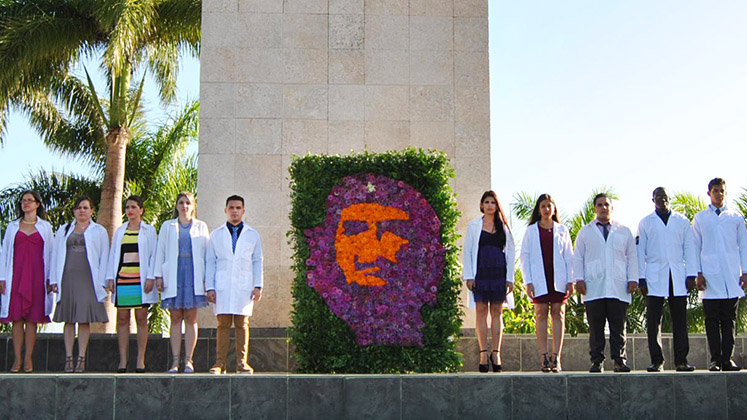
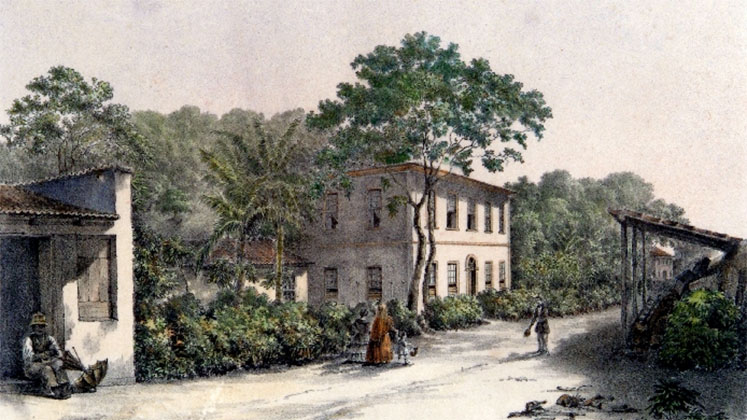

Dear Timothy, this is a good article but I disagree to the fullest extent with your opinion, and I will explain why.
1. Have you ever been to Venezuela? If Yes have you been there recently? Do you even know anyone that has recently fled that country? I do, go there a lot for my job and it is hell on earth! it is bad! people are eating stray dogs for dinner and sometimes en up getting murdered trying to hunt for dinner. Does that give you a picture of how bad it is?
The only reason it is this bad is because of perfect implementation of a socialist/corrupt governement.
2. There NEEDS to be a change, but how? The international community so far has been incapable making any change! Nothing NADA. You could argue that the UN, OAS, or even the US has no right violating the sovereignty of another country, but at the end of the day, if the only route to change is via the international community, guess what, it will NEVER come. The only positive outcome for Venezuela is if change comes from within, and a civil war would be long,bloody, and and painful. The next best option would be a military coup de etat. Trump is totally correct when he addresses to the military, because they are the last and only hope for the country. Obviously the leadership of the military is the last stronghold of support for Maduro that is the only reason a Coup has not happened yet, but with a little input from Trump, suggesting that the US will support, might just be the tipping of the scale in favor of a regime change.
3. Venezuela has had various Coup te etats in the past 100 years and the result was always better than the current regime ( venezuela has never been this bad)
4. Trying to say that there shouldn’t be a coup because ….look at human rights abuses during Pinochet’s Chile is like a person dying with a disease saying I will not get treatment because I know someone that had a bad experience with the treatment, so I’d rather not even try. NOT LOGICAL
Have a great day!
Dear Dr. Gill,
The following quote from your article requires attention and further elaboration:
“the opposition has periodically called for the ouster of Maduro through nationwide protests”
The quote demonstrates a lack of understanding of the Venezuelan constitution which provides an inalienable right to protest. Therefore, any opposition to Maduro’s dictatorial regime and the PSUV’s illegitimate ANC would surely utilize this inalienable right to show their discontent.
The quote is followed by the following:
” …that have resulted in the death of dozens of Venezuelans, amongst them security forces, opposition activists, and government supporters alike.”
You fail to elaborate on the above or provide figures. In 2017 there were at least 160 casualties made up of opposition activists and innocent non-partisan civilians.
https://www.observatoriodeconflictos.org.ve/sin-categoria/venezuela-6-729-protestas-y-157-fallecidos-desde-el-1-de-abril-de-2017
What figures do you hold for 2017 on the number of causalities that were confirmed security forces and confirmed supporters of Maduro’s dictatorial regime?
Since you have demonstrated an interest in Venezuelan politics, if you have a spare moment I encourage you to listen to the following authored by artists who have been living through the crisis in Venezuela:
https://humanoderechorecords.bandcamp.com/album/rock-contra-la-dictadura-venezuela-volumen-01
This article shows how disconnected many academics are regarding the brutality and lawlessness of socialist regimes in Latin America.
Someone who claims, for example, that Maduro’s 2013 election was “generally considered free and fair” has no idea about life in Venezuela and the regime’s manipulation of elections.
Thanks for the comment, Fergus.
While there were criticisms of, for example, government use of state funding for Maduro’s campaign during the 2013 election, fraud accusations have nearly nonexistent support. We could certainly have a conversation about fraud, manipulation, and recent elections in Venezuela, but, as far as the 2013 election goes, the economy was not yet in the doldrums it is today, and Maduro still benefited quite nicely from his relation with the recently deceased former President Chavez.